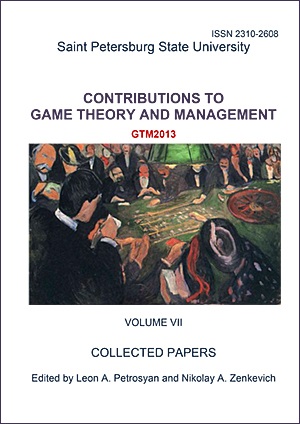Differential Games with Random Duration: A Hybrid Systems Formulation
Abstract
The contribution of this paper is two-fold. First, a new class of differential games with random duration and a composite cumulative distribution function is introduced. Second, it is shown that these games can be well defined within the hybrid systems framework and that the problem of finding the optimal strategy can be posed and solved with the methods of hybrid optimal control theory. An illustrative example is given.
Keywords:
games, hybrid
Downloads
References
Downloads
Published
How to Cite
Issue
Section
License
Articles of "Contributions to Game Theory and Management" are open access distributed under the terms of the License Agreement with Saint Petersburg State University, which permits to the authors unrestricted distribution and self-archiving free of charge.




